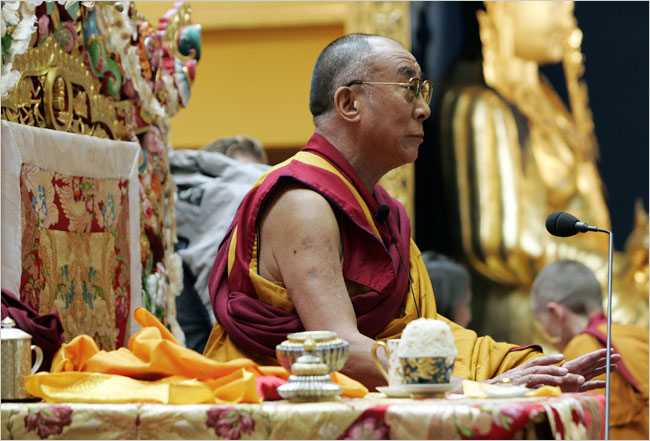|

Thibault Camus/Agence France-Presse — Getty Images
The Dalai Lama, 73, during a visit to France last week, part of his extensive travels in the months before the Beijing Olympics.
|
NEW DELHI — The Dalai Lama is exhausted.
So announced his office in a statement Wednesday, adding that on the advice of his doctors he had canceled foreign trips for the next three weeks.
The declaration of fatigue should come as no surprise to anyone aware of the rigorous schedule that the 73-year-old Dalai Lama keeps. In the months leading to the Beijing Olympics, he kept up an especially grueling travel schedule, meeting world leaders to drum up support for the Tibetan cause and conducting teachings on Tibetan Buddhism.
But the announcement of his decision to take a break raises important questions, so far unanswered, about the state of the Dalai Lama’s health and the state of his efforts to reach a diplomatic accord on Tibet’s status under Chinese rule.
For nearly 50 years, since fleeing Chinese-controlled Tibet for exile in India, the Dalai Lama has failed to reach an agreement with the Chinese government that would clear the way for him to return to Tibet in exchange for China’s granting the region greater freedoms.
Years ago the Dalai Lama gave up calls for independence from China, saying instead that he favored greater autonomy for the Tibetan areas within the framework of the Chinese Constitution.
Whoever succeeds him is likely to face considerably more pressure from a new generation of more radical Tibetans to demand much more from the Chinese in terms of Tibetan freedoms, even as far as full independence. That has led some Tibetans and international observers to argue that it is in China’s interest, as well as that of average Tibetans, for China and the Dalai Lama to reach a settlement before he dies.
“If the Dalai Lama becomes seriously ill, or worse, and Tibetans inside Tibet get the idea that this is because of China, or because China has deliberately or carelessly refused to take the chance to reach a resolution with the Dalai Lama, I think China would face an irrevocable problem,” Robbie Barnett, director of the modern Tibetan studies program at Columbia University, said by telephone. “After the Dalai Lama goes, there will be no way China can win credibility with the Tibetan people. It will never be able to say, ‘There wasn’t the time to make a deal with Dalai Lama.’ ”
The Dalai Lama’s relations with the government in Beijing have been strained in recent months. Violent protests against Chinese control erupted in March inside the Tibetan areas of China, and were met with swift repression. The Dalai Lama admitted at the time to feeling helpless to stop the troubles, and yet the unrest, coming in advance of the Olympic Games and drawing worldwide attention, clearly gave the Tibetan cause the greatest impetus it had seen in many years.
v
The Chinese government repeatedly accused the Dalai Lama of being the instigator of the troubles and said he was trying to split the country, but agreed to reopen talks with his envoys in May and June. The talks have yielded no breakthroughs; the next round is scheduled for October.
But there are also hints of incremental progress that may shed another light on the announcement that the Dalai Lama was canceling some overseas travel. Earlier this summer, an unidentified third party suggested that the Dalai Lama might visit China — for the first time since 1959 — to participate in a memorial service for those who died in May’s Sichuan earthquake, an aide to the Dalai Lama said. The aide, Chhime R. Chhoekyapa, called the offer only a vague "floater” and said there had been no official invitation. Therefore, there was no question of his either accepting or rejecting an offer to go to China, he said.
Officials in the self-described Tibetan government in exile in the northern Indian town of Dharamsala have repeatedly said that China must ease restrictions inside Tibet before the Dalai Lama can visit China.
Even so, the overture raised hopes in some circles that the Dalai Lama might have the chance to visit China. Beijing staunchly opposes his high-profile tours to foreign countries. He had been scheduled to visit the United States for a third time in less than six months, a prospect that the Chinese were unlikely to relish.
Whether the decision not to travel means the Dalai Lama is tired, sick or just diplomatically savvy remains to be seen.
Jim Yardley contributed from Beijing.
